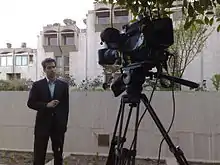Cal Perry
Cal Perry (born October 6, 1979) is a broadcast journalist, currently working for MSNBC. Previously worked at Voice of America in a senior role and briefly at Al Jazeera English. Before joining Al Jazeera he worked for many years with CNN, mostly in the Middle East. During this time, he served as: Bureau Chief in Baghdad, Iraq (2005-2007), Bureau Chief in Beirut, Lebanon. From these bases, he also covered the wars in Lebanon (2006), Georgia (2008) and Pakistan (2008), plus the aftermath of the devastating cyclone in Bangladesh, in 2007.
Cal Perry | |
|---|---|
 | |
| Born | Cal Perry October 6, 1979 Washington, DC |
| Education | Skidmore College (B.A.) |
Notable credit(s) | MSNBC |
Personal
His father is Mark Perry, an American author specializing in military, intelligence, and foreign affairs analysis.[1]
Career
Perry's international career began as a program officer for the Vietnam Veterans of America Foundation, serving in Hanoi, the capital of Vietnam. On his return, he was chief researcher at the National Veterans Legal Services Program, in Washington, D.C..
He began his career at CNN as an international assignment editor on the network’s foreign desk in Atlanta, Georgia. As international assignment editor, Perry was responsible for all aspects of network news gathering, coordinating the international coverage for all of CNN’s networks, producing reporter live shots and determining the editorial content for the CNN news packages.
His next assignment was in the field, as a producer in Iraq. Initially an embedded producer in 2003, Perry remained in the country, based in Baghdad, during which time he reported from nearly all of Iraq’s provinces. He covered the U.S. war in Iraq with numerous embeds, which included producing and directing a report on U.S. special operations forces – the first international correspondent to do so. During his time in-country, Perry produced, directed and reported the award-winning CNN documentary "Combat Hospital,"[2] an inside look into one of the U.S. military's busiest combat hospitals in Iraq.
In November 2004 Perry organized CNN’s West Bank coverage of the death and funeral of Palestinian President Yasser Arafat, an opportunity which arose from his previous service as press officer for the European Union’s Reconciliation Program, during the Second Palestinian Intifada. In this press officer position, Perry participated in discussions with a broad spectrum of policy-makers on public relations issues relating to the Israel-Palestinian conflict.
Perry and correspondent Karl Penhaul won the Edward R. Murrow award for "Continuing Coverage: CNN, Coverage of the Middle East Conflict" for their coverage of the 2006 war between Israel and Hezbollah. Perry and Penhaul were the first journalists to arrive in Tyre, Lebanon amid the early fighting in 2006.[3] As one of only a handful of journalist teams present in Southern Lebanon during the first five days of the war, they provided important coverage during the first week of the war. Perry published the article "The True Cost of War"[4] for cnn.com, describing his experiences in Lebanon during that time.
In 2007, Perry was among the first reporters to appear live from Bangladesh during the massive cyclone Sidr providing both on-air coverage[5] and still photographs.
As the CNN liaison for the Middle East and CNN’s bureau chief in Lebanon, Perry conducted a series of first-time interviews with prominent world leaders. In August 2007 he conducted an exclusive interview[6] with the exiled Hamas leader Khaled Meshaal from a safe house in Syria. Perry was one of the first reporters from the Western media to interview Meshaal and published a well-known article entitled "Face to Face with top Hamas Leader in a Secret Location".[6] In 2008, Perry became one of the first reporters in more than three years to interview the President of Syria,[7] Bashar Al-Assad in English. Additionally, Perry interviewed Syrian first lady[8] Asma al-Assad in 2009, and Saad Hariri, the Lebanese prime minister, in the first interview with him after his election, in 2008.
Controversy
In 2020, Perry received criticism when he was called out by a bystander for attempting to shame people not wearing masks when half of his own camera crew were not masked. Perry was delivering a Memorial Day report from Lake Geneva as hundreds traveled on holiday weekend in Wisconsin where businesses reopened post lockdown. He stated he hadn't met "anybody" who cared about their personal safety. Perry had been attempting to use a bystander as an example of how visitors to the area were not covering their faces. The bystander clapped back that Perry's crew were doing the same.[9][10] [11]
Awards
Perry won an Alfred I. duPont–Columbia University Award for his work in the networks coverage of the "capture of Saddam Hussein."
Perry was involved in the reporting that won CNN the "Edward R. Murrow" award for Excellence in Journalism for the network's coverage of the 2006 war between Lebanon and Israel.
Photography
Perry has also worked as a photojournalist and has published a series of exclusive still photographs of combat action with the Marine Corps in Ramadi, Fallujah and other cities in Iraq.
References
- "Mark Perry". Eisenhower Institute. Archived from the original on 3 September 2014. Retrieved 1 September 2014.
- "CNN Combat Hospital Music Video (Coldplay)". YouTube. 2007-06-09. Retrieved 2014-04-29.
- "rtndf.org".
- Cal Perry CNN. "The true cost of war - Jul 21, 2006". CNN.com. Retrieved 2014-04-29.
- "CNN Video - Breaking News Videos from". CNN.com. Retrieved 2014-04-29.
- Cal Perry CNN. "Face-to-face with top Hamas leader in secret location - CNN.com". Edition.cnn.com. Retrieved 2014-04-29.
- "Syria floats direct talks with Israel". CNN.com. 2008-09-05. Retrieved 2014-04-29.
- "YouTube". YouTube. Retrieved 2014-04-29.
- "YouTube". www.youtube.com. Retrieved 2020-07-01.
- "Joe Concha on Twitter". Twitter. Retrieved 2020-07-01.
- "MSNBC's Cal Perry Called Out People on Air for Not Wearing Masks — and It Didn't Go Well". www.yahoo.com. Retrieved 2020-07-01.